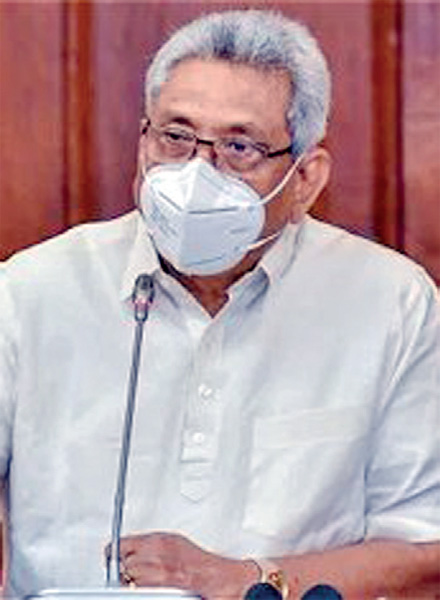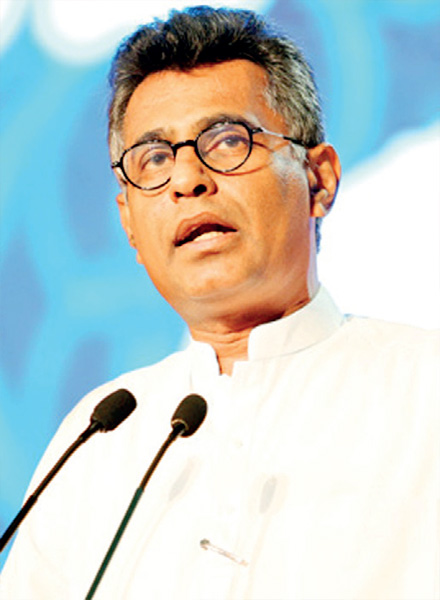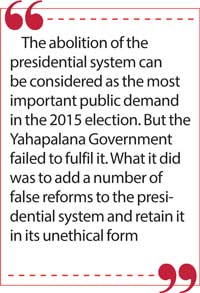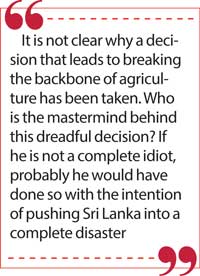Thursday Feb 19, 2026
Thursday Feb 19, 2026
Friday, 18 June 2021 00:01 - - {{hitsCtrl.values.hits}}

President Gotabaya Rajapaksa

MP Champika Ranawaka
 For some time some important events in Sri Lanka have taken place in an uncanny and comical manner. A country cannot fall into
For some time some important events in Sri Lanka have taken place in an uncanny and comical manner. A country cannot fall into
such a failed state in the absence of a complete breakdown of the critical intellect of society including academic intelligentsia.
A complete breakdown of the critical intellect of a society cannot occur suddenly. It could happen only as an outcome of a gradual process. The role of President Gotabaya should be understood in this perspective as a new chapter of the old drama itself, and not as a new drama. The rule of Gotabaya was born out of the womb of the Yahapalana regime. It was the midwives of the Yahapalana regime who severed the umbilical cord to release him to leadership.
The true political nature of this comedy can only be understood by understanding the interrelationship between the present regime and the previous Government, and especially by sharpening the political knowledge through realising the puzzles that have arisen in connection with this relationship.
Puzzle No. 1: Presidential system
There are about 10 significant puzzles that Sri Lanka needs solved. But I intend to discuss only two of them here – the puzzle of the presidential system and that of the ban on chemical fertiliser.
The abolition of the presidential system can be considered as the most important public demand in the 2015 election. But the Yahapalana Government failed to fulfil it. What it did was to add a number of false reforms to the presidential system and retain it in its unethical form. If the presidential system operative in Sri Lanka is to be restored to a civilised level, it is important that the president himself shall be placed under the rule of law of the country so that his arbitrary power and the plunder of public property occurring under his leadership would come to an end.
What the Yahapalana regime should have done was to abolish the presidential system, in response to the public demand, and restore the parliamentary system while introducing positive reforms conducive to building the nation and recreating the state which had reached a pathetic level of degeneration, and convert the country into a modern and efficient State, thereby winning and reinforcing the public confidence.
Yet, what has actually happened under the Yahapalana regime was to carry out an ostentatious anti-Rajapaksa campaign followed by a fake reform program. If the presidential system was abolished along with the introduction of the other essential reforms or at least, if legislation was enacted placing the president below the law in case it still wanted to maintain the presidential system and continue with it, certainly such reforms would not have been simple or easy to be reversed.
Why didn’t the Yahapalana Government abolish the presidential system in line with the aspirations of the people? The response I have received from some leaders of the Yahapalana Government was that at one point all the leaders except Champika Ranawaka were willing to abolish the presidential system and it had to be reversed due to the objection from Champika.
Why did Champika want to maintain the presidential system? Was it because he believed that it was the only possible way for him to come to power? If not, why? If he still wanted to maintain the presidential system, why did he opt to maintain it in its old unethical form without changing the unethical and uncivilised structure of it? What is Champika’s response to this allegation?
If everyone else in the Yahapalana Government supported the abolition of the presidential system, then why did they refrain from doing it, ignoring Champika’s objections? Was it because the political leaders who have been dreaming of being the Head of State felt that it would one day fall into their lap, if the presidential system is preserved ?
That all members of the State, including the Head of State, should be subjected to the rule of law is a very popular and well-acknowledged democratic concept. If, for whatever reason, they have decided to maintain the presidential system, a question arises as to why they refrained from subjecting the president to the rule of law. In addition to Champika, what have the other leaders of the Yahapalana regime like Ranil, Karu, Mangala, Sajith and Anura Kumara got to say about it?
 Puzzle No. 2: Ban on chemical fertiliser
Puzzle No. 2: Ban on chemical fertiliser
In the face of the debt crisis facing Sri Lanka, there is a need to control the cost of imports to the maximum. But chemical fertiliser can be considered as an essential item that should be imported continuously for the sustenance and betterment of agriculture.
Agriculture should have been the major sector for the Government’s attention to ease the burden of the present crisis until a complete solution is found for it. Agriculture could have had the capacity to ensure food security whilst at the same time creating an environment conducive to providing a safety net for those retrenched from the industrial sector due to the current economic slowdown.
The ban on chemical fertiliser will invariably result in killing the potentiality of agriculture. The decision to issue guns to farmers to overcome the challenge posed by increased population density of wild animals is correct. However, the impact of the ban on chemical fertiliser on agriculture might be extremely devastating. An objective analysis of facts should have been made before reaching a decision on that. It is not a decision that the President or the Cabinet alone could make. It is a decision that should be made after serious consideration of recommendations of agronomists and agriculture officers. But the decision has been taken by the political authority in an arbitrary manner.
If there was a problem in making payment in dollars for the import of chemical fertiliser and the other chemical inputs, Sri Lanka could have been able to meet the requirement with alternate means instead of paying in dollars. India and China are among the major producers of chemical fertiliser. Sri Lanka could have obtained the requirement of chemical fertiliser from China and also from India through credit facilities available.
It is not clear why a decision that leads to breaking the backbone of agriculture has been taken. Who is the mastermind behind this dreadful decision? If he is not a complete idiot, probably he would have done so with the intention of pushing Sri Lanka into a complete disaster.
 Historical background of ban on chemical fertiliser
Historical background of ban on chemical fertiliser
The Government alone cannot be blamed for the ban on chemical fertiliser. An ideological movement has been active in the country for nearly four decades advocating for organic farming devoid of chemical fertiliser, pesticide or herbicide.
Sarath Justin Fernando, the founder of the Movement for Land and Agricultural Reform (MONLAR), can be considered as the founding theorist of this ideological movement in Sri Lanka. As far as I know, he was the first theorist in Sri Lanka to advocate for organic farming. Subsequently, it was Champika Ranawaka who appeared as a theorist of such a program. He was not a parliamentarian at that time, and was the head of a youth movement called ‘Janatha Mithuro,’ the ‘People’s Friends’.
The idea of an eco-friendly farming system devoid of the use of chemical fertiliser, insecticide and herbicide which depends solely on carbonic fertiliser is not an idea generated in Sri Lanka. It was an ideological movement developed in association with the Green Movement in Europe.
Both Sarath and Champika were leaders of two indigenous schools of this ideological trend that had developed in Europe. At the time, Champika was not firmly attached to the Sinhala-Buddhist ideological movement. They both had the ability to socialise this ideology with an anti-imperialist militant flavour as it reflected a character of anti-multinational companies.
Sarath socialised the idea through publication of small books and leaflets. Champika wrote a series of articles on farming without chemical fertiliser, pesticide or herbicide for ‘the Wednesday Magazine Page’ of the Divaina Newspaper based on the book titled ‘One Straw Revolution’ by Masanobu Fukuoka, a well-known Japanese theoretician on natural agriculture. I knew both Sarath and Champika, and had exchanged views on this ideology when they met me, separately. Perhaps, I may have been the only one who has criticised this tendency upheld by them at that time.
At that time, I did not reject organic farming completely. It was my opinion that carbonic fertiliser could be used for home gardening, but not for large-scale cultivation; despite adverse effects, advanced agriculture cannot be sustained without chemical fertiliser, pesticide and herbicide. Also the agricultural yield from organic fertiliser is very low compared to the use of chemical fertiliser and the cost of production is higher than the cost of production incurred in using chemical fertiliser.
Sarath Justin is no longer alive. Champika can be considered as an important figure who has carved an important niche in the queue of political leaders who are vying for State power in Sri Lanka. It is now more than 30 years since these two have talked about a method of farming devoid of chemical fertiliser, herbicide or pesticides; yet it is less than 2% of the world’s cultivated land that has been set aside for agriculture without using chemical fertilisers, pesticides and herbicides. What they produce is consumed by the rich, not the common people.
In retrospect, if both Sarath and Champika had spent their valuable time which they have dedicated in inculcating the ideology of agriculture devoid of chemical fertiliser to enlighten the users of chemical fertiliser on how the chemical fertiliser, pesticide and herbicide are used in a way that minimises the harm caused to farmers and the environment, and also worked towards adopting a policy that ensures the import of chemical fertiliser was pursued in keeping with high standards, I think their efforts would have been more fruitful. I do not know whether Champika has abandoned this ideology, and if so to what extent. But now he is not appearing for it in public.
After him the flag was taken over by Ven. Athuraliye Rathana Thero. The President of the Yahapalana Government allocated a large sum of money to run a national level program for non-toxic farming. Athuraliye Thero travelled by helicopter to attend some activities of the projects. This clearly shows that organic farming devoid of chemical fertiliser, pesticide and herbicide had been officially recognised during the Yahapalana regime as well.
Dr. Channa Jayasumana can be considered as the person who carried the debate on non-toxic farming to its culmination. Now he is a Minister of the present Government. He was able to socialise strongly that the spread of kidney disease in the Rajarata region was a dreadful legacy of the use of agrochemicals, mainly glyphosate. Through this, the flag of non-toxic farming devoid of chemical fertiliser, which had so far been held by the ‘School of Jathika Chinthanaya’ led by Champika, was usurped by the school of the same chinthanaya led by Nalin de Silva.
The controversial research conducted at the University of Kelaniya to explore the causes of kidney disease in the Rajarata area was conducted by a woman, said to be a devotee of the God Natha, who claimed to have done the research under the divine inspiration and guidance of this God. This led to reinforce the theory socialised by Dr. Channa (his interpretation of the causes of kidney disease) and generate a tremendous social phobia about the use of chemical fertiliser, insecticide and herbicide.
According to Bertrand Russell, instilling fear is a means of securing public submission. The story socialised about Dr. Shafi is one example that can be cited for that. The story fabricated about the demise of Ven. Gangodawila Soma Thero is another. In each case, it can be said that the submission of the public had been secured by instilling a great fear in them. Although there may have been a few who had personally benefited from these manoeuvrings, the loss to the country was enormous.
 Questioning the leaders
Questioning the leaders
I was prompted to write this article as an aftermath of an experience I faced. Following the announcement of the ban on chemical fertiliser, I wrote a critique on it, entitled ‘The abandonment of the use of chemical fertiliser’. Upon publication of this article, Nishantha Warnakulasuriya invited me to address a Zoom conference organised by the ’43rd Senankaya’ on the subject.
I expressed my inability to take part in that conference, and I queried him as to how they, as a movement that has once adopted a stand against the use of chemical fertiliser, justify their move to protest against the Government’s program. His response was that the speakers representing views for and against on the subject had been invited for the debate.
Subsequently, I discussed the matter with a friend of mine who has his own views of the subject, and also has close contacts with Champika. He was unhappy about my refusal to participate in the Zoom conference and criticised me for questioning Champika’s stance on the fertiliser issue. He said that compared to his past Champika has come a long way and has changed a lot for the better, and therefore, it is not ethical to question him in a manner that would put him in a difficult situation.
In defence, I explained to my friend that not only Champika, but any other political leader who aspires for national leadership should be questioned intensely and made to explain their solutions for the crisis Sri Lanka is facing, apart from clarifying their political practice.
I am of the view that the ‘2015 scenario’ should not be permitted to recur. Although it has not been adequately appraised yet, it can be considered as a massive fraud committed against the public, knowingly or unknowingly. All leaders vying for State power should be assiduously questioned.